Dickensians! discussion
Buddy Reads
>
Buddy read of David Copperfield May 2021 onwards with Cozy_Pug, Sue, Bridget, Fiona and Jenny
 Fiona wrote: "Cozy_Pug wrote: "Well, that was an incredibly heart breaking chapter! You all have the same thoughts I do. David's memories, the sounds, the sights - the descriptions are marvelous. I also wonder w..."
Fiona wrote: "Cozy_Pug wrote: "Well, that was an incredibly heart breaking chapter! You all have the same thoughts I do. David's memories, the sounds, the sights - the descriptions are marvelous. I also wonder w..."Me too!
Tomorrow is a free day - take a break, catch up, or read ahead as you wish.
Chapter 10 on Saturday :D
Chapter 10 on Saturday :D
 Agree with others about the amount of pathos and sadness in Chapter 9. It seems that David has had to encounter so many transitions and difficult setbacks in his young life, and I'm sure he will have to encounter more. I think it is so powerful how Dickens, through David's narration, is able to capture these moments so perfectly.
Agree with others about the amount of pathos and sadness in Chapter 9. It seems that David has had to encounter so many transitions and difficult setbacks in his young life, and I'm sure he will have to encounter more. I think it is so powerful how Dickens, through David's narration, is able to capture these moments so perfectly. I'm liking the one day a chapter format. It is getting me a chance to read, take a little bit of a breath, and reflect and get ready for the next chapter.
Chapter 9 was about David's "memorable birthday", but memorable for all the wrong reasons of course. I thought I'd mention that this was David's 9th birthday; I like knowing his age as the story progresses.
Franky - I agree - Dickens taps into a child's mind so well. When David was walking in the playground at school before he was collected to go home, he felt a bit special when the boys looked out the classroom windows at him. It's very believable for a 9 year old boy - he's stunned and devastated that his mother died, but he likes the bit of attention it brings him. Sort of the role of orphan mourner. Just brilliant.
Franky - I agree - Dickens taps into a child's mind so well. When David was walking in the playground at school before he was collected to go home, he felt a bit special when the boys looked out the classroom windows at him. It's very believable for a 9 year old boy - he's stunned and devastated that his mother died, but he likes the bit of attention it brings him. Sort of the role of orphan mourner. Just brilliant.
Angela wrote: "Hi friends, I thought chapter 10 was today! Guess I'm ahead for once in my life. :)" and Franky too.
LOL We read a chapter a day when this was our group read, and found it much the best way to get a lot out of it - though buddy reads can be a bit different. For more details of who was the inspiration for who (such as Mr Creakle!) and extra information, remember to check out the original threads :)
LOL We read a chapter a day when this was our group read, and found it much the best way to get a lot out of it - though buddy reads can be a bit different. For more details of who was the inspiration for who (such as Mr Creakle!) and extra information, remember to check out the original threads :)
Chapter 10 illustrations -

"Mrs Gummidge casts a damp on our departure", Phiz 1849
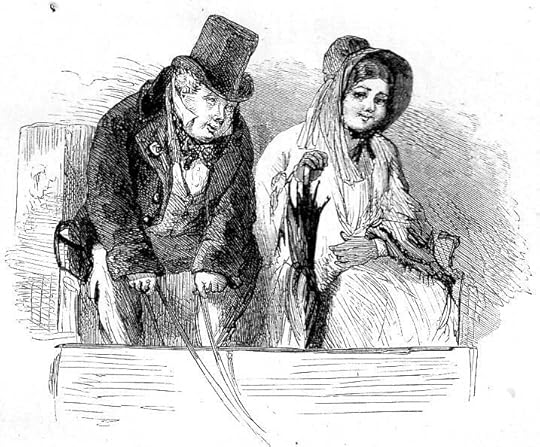
"Peggotty and Barkis", Sol Eytinge Jr, 1867

"Mrs Gummidge casts a damp on our departure", Phiz 1849

"Peggotty and Barkis", Sol Eytinge Jr, 1867
Interesting how this chapter recalls the pattern earlier in the book - David goes to Yarmouth for a lovely, pleasant visit, then returns to his home to an upheaval in his life. It would be wonderful if David could live with Mr Peggotty, but that wouldn't make as good a story I guess.
Barkis' wooing of Peggotty is delightful! What a simple but pleasant courtship - except the gift of pigs' trotters. That's gross lol, but I suppose useful and appreciated at the time. I hope Barkis will be a good husband because Peggotty is a treasure of a woman - she deserves the best.
I love how Dickens describes David's altered view of the Peggotty home in Yarmouth -
It looked just the same, except that it may, perhaps, have shrunk a little in my eyes;
Now, the whole place was, or it should have been, quite as delightful a place as ever; and yet it did not impress me in the same way. I felt rather disappointed with it.
It's as though David's vision is changed after his time in London, away from Blunderstone Rookery and Yarmouth. And Little Em'ly seems different to him -
But I felt that we should not have had those old wanderings, even if it had been otherwise. Wild and full of childish whims as Em’ly was, she was more of a little woman than I had supposed. She seemed to have got a great distance away from me, in little more than a year.
Dickens creates that feeling in childhood where there's a friend you see maybe only on summer vacations, and you don't feel you've changed in the year that passed, but your friend and everything else has.
I love David's dream of perfect love with Little Em'ly -
What happiness (I thought) if we were married, and were going away anywhere to live among the trees and in the fields, never growing older, never growing wiser, children ever, rambling hand in hand through sunshine and among flowery meadows, laying down our heads on moss at night, in a sweet sleep of purity and peace, and buried by the birds when we were dead!
The fairy tale or knight's tale element pops up again -
I felt very brave at being left alone in the solitary house, the protector of Em’ly and Mrs. Gummidge, and only wished that a lion or a serpent, or any ill-disposed monster, would make an attack upon us, that I might destroy him, and cover myself with glory.
But then the return to his miserable home that isn't really his home anymore -
the house, in which there was no face to look on mine with love or liking anymore.
And all David has is -
the old books. They were my only comfort;
So back to London now, but for something that sounds like it will be much worse than Salem House. :(
I highlighted so many passages in this chapter, I really love it. This though is my favorite, because I, too, have a charmed memory of childhood that is sheer, unbeatable perfection -
It seems to me, at this hour, that I have never seen such sunlight as on those bright April afternoons; that I have never seen such a sunny little figure as I used to see, sitting in the doorway of the old boat; that I have never beheld such sky, such water, such glorified ships sailing away into golden air.
Barkis' wooing of Peggotty is delightful! What a simple but pleasant courtship - except the gift of pigs' trotters. That's gross lol, but I suppose useful and appreciated at the time. I hope Barkis will be a good husband because Peggotty is a treasure of a woman - she deserves the best.
I love how Dickens describes David's altered view of the Peggotty home in Yarmouth -
It looked just the same, except that it may, perhaps, have shrunk a little in my eyes;
Now, the whole place was, or it should have been, quite as delightful a place as ever; and yet it did not impress me in the same way. I felt rather disappointed with it.
It's as though David's vision is changed after his time in London, away from Blunderstone Rookery and Yarmouth. And Little Em'ly seems different to him -
But I felt that we should not have had those old wanderings, even if it had been otherwise. Wild and full of childish whims as Em’ly was, she was more of a little woman than I had supposed. She seemed to have got a great distance away from me, in little more than a year.
Dickens creates that feeling in childhood where there's a friend you see maybe only on summer vacations, and you don't feel you've changed in the year that passed, but your friend and everything else has.
I love David's dream of perfect love with Little Em'ly -
What happiness (I thought) if we were married, and were going away anywhere to live among the trees and in the fields, never growing older, never growing wiser, children ever, rambling hand in hand through sunshine and among flowery meadows, laying down our heads on moss at night, in a sweet sleep of purity and peace, and buried by the birds when we were dead!
The fairy tale or knight's tale element pops up again -
I felt very brave at being left alone in the solitary house, the protector of Em’ly and Mrs. Gummidge, and only wished that a lion or a serpent, or any ill-disposed monster, would make an attack upon us, that I might destroy him, and cover myself with glory.
But then the return to his miserable home that isn't really his home anymore -
the house, in which there was no face to look on mine with love or liking anymore.
And all David has is -
the old books. They were my only comfort;
So back to London now, but for something that sounds like it will be much worse than Salem House. :(
I highlighted so many passages in this chapter, I really love it. This though is my favorite, because I, too, have a charmed memory of childhood that is sheer, unbeatable perfection -
It seems to me, at this hour, that I have never seen such sunlight as on those bright April afternoons; that I have never seen such a sunny little figure as I used to see, sitting in the doorway of the old boat; that I have never beheld such sky, such water, such glorified ships sailing away into golden air.
 The line that made me laugh the loudest in this chapter was about how Barkis was “a little near”(Peggotty’s description) meaning he’s a miser “so that Peggotty had to prepare a long and elaborate scheme, a very Gunpowder Plot, for every Saturday's expenses.”
The line that made me laugh the loudest in this chapter was about how Barkis was “a little near”(Peggotty’s description) meaning he’s a miser “so that Peggotty had to prepare a long and elaborate scheme, a very Gunpowder Plot, for every Saturday's expenses.”So as much as the courtship and wedding was sweet and silly, Barkis might be a mean husband.
So Davy is off to work for the Murdstone business. I think they aren’t telling him everything. Surely his mother or father would’ve left him something.
Janelle wrote: "The line that made me laugh the loudest in this chapter was about how Barkis was “a little near”(Peggotty’s description) meaning he’s a miser “so that Peggotty had to prepare a long and elaborate s..."
Lol, that made me laugh, too! But yes, I'm worried Barkis may not treat Peggotty as she deserves to be treated :(
I wonder about what's going on with the Murdstones, too. David mentioned at one point that Mr Murdstone seemed to be in straitened circumstances. Why would Clara's death worsen his financial position so much? I still think the She-Devil Murdstone is hunting in the house for something that belongs to David by right - a codicil to a will, cash, jewelry. Why else does she keep going through the cupboards and looking in pickle jars? Does she think coins or jewelry would be hidden in a jar of pickles lol?
Lol, that made me laugh, too! But yes, I'm worried Barkis may not treat Peggotty as she deserves to be treated :(
I wonder about what's going on with the Murdstones, too. David mentioned at one point that Mr Murdstone seemed to be in straitened circumstances. Why would Clara's death worsen his financial position so much? I still think the She-Devil Murdstone is hunting in the house for something that belongs to David by right - a codicil to a will, cash, jewelry. Why else does she keep going through the cupboards and looking in pickle jars? Does she think coins or jewelry would be hidden in a jar of pickles lol?
 Yes, definitely more going on, CozyPug. I’m sure Dickens will let us know at exactly the right time!
Yes, definitely more going on, CozyPug. I’m sure Dickens will let us know at exactly the right time!
 And will the famous Aunt help him.
And will the famous Aunt help him.I was thinking of Dickens working to support himself at a similar age to Davy.
 That's what I was hoping for Sue. Some idea that Aunt Betsy might change her tune and help her nephew.
That's what I was hoping for Sue. Some idea that Aunt Betsy might change her tune and help her nephew. I did love the sweet, innocence of young "love" (if you can call it that) with Davy and Emily. She is a beauty and knows it I believe. We know there was foreshadowing about her early on, so the Yarmouth crew aren't leaving our story for good!
 Chapter 10 I loved the wedding scene. It was so full of joy and mischief for everyone. I’m sure Peggotty will get the better of Barkis’s tightness. She’s a wily old bird!
Chapter 10 I loved the wedding scene. It was so full of joy and mischief for everyone. I’m sure Peggotty will get the better of Barkis’s tightness. She’s a wily old bird!David’s neglect is the more pitiful because he has basic comforts - a home, food, clothing, his old books - but is starved of company and love. I’m not sure if going to London will be entirely a bad thing but I wouldn’t trust Quinion or Murdstone as far as I could throw them so I suspect it won’t be good.
Why is Murdstone in ‘straitened circumstances’? Is it possible that although Clara would have been the main benefactor of her husband’s will, everything passes to Davy if she dies? If so, it doesn’t benefit Murdstone to be bad to him, rather he could have become his guardian and lived off him. Time will tell.
 I've read up to chapter six. I really like David's narrative voice; he manages to seam upbeat no mater what. The Murdestones make me so mad! Be firm, Clara! Show your boy no love! Ohhhh I want to smack some people soooo bad!
I've read up to chapter six. I really like David's narrative voice; he manages to seam upbeat no mater what. The Murdestones make me so mad! Be firm, Clara! Show your boy no love! Ohhhh I want to smack some people soooo bad! There being passengers on the outside and top of the carriage reminds me of a "ridiculous law" from New York- Cabs may not carry passengers on the roof. Perhaps this is where that law originated?
 When Clara died, did she own anything? I thought at that time a husband legally owned his wife & all her possessions as soon as they married, so any inheritance she had from her first husband had already become Murdstone’s property. But I agree with Janelle & Fiona that we haven’t been given a reason why Murdstone has less money now.
When Clara died, did she own anything? I thought at that time a husband legally owned his wife & all her possessions as soon as they married, so any inheritance she had from her first husband had already become Murdstone’s property. But I agree with Janelle & Fiona that we haven’t been given a reason why Murdstone has less money now.
 Chapter 11 We learn so much about life in Victorian London in this chapter and have the pleasure of meeting the infamous Micawbers. It has always fascinated me that debtors’ prisons were so open to visitors and that whole families would move in to live in them. I’m wondering how the arrangement for Davy’s accommodation works since Micawber finds him digs while he is in prison. Is Murdstone financing him, directly or through Quinion? I also wondered why they would go to the bother of finding digs for the ‘Orfling’ (I love that!).
Chapter 11 We learn so much about life in Victorian London in this chapter and have the pleasure of meeting the infamous Micawbers. It has always fascinated me that debtors’ prisons were so open to visitors and that whole families would move in to live in them. I’m wondering how the arrangement for Davy’s accommodation works since Micawber finds him digs while he is in prison. Is Murdstone financing him, directly or through Quinion? I also wondered why they would go to the bother of finding digs for the ‘Orfling’ (I love that!).It’s interesting to read the older David’s (Dicken’s) thoughts on character development in fiction writing later in life.
Chapter 11 illustrations, or many interpretations of Mr Micawber :D

"My magnificent order at the public house" by Phiz, 1849

"I begin life on my own account..." by Fred Barnard, 1872
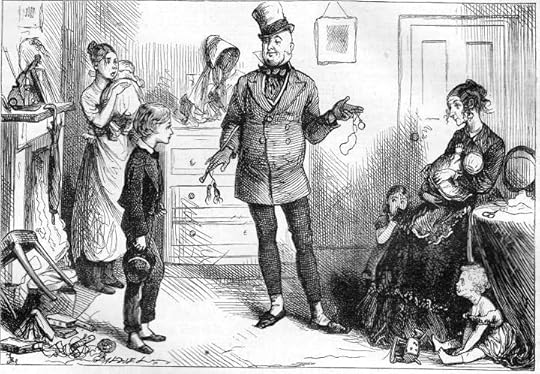
"I am presented to Mrs Micawber" by Fred Barnard, 1872
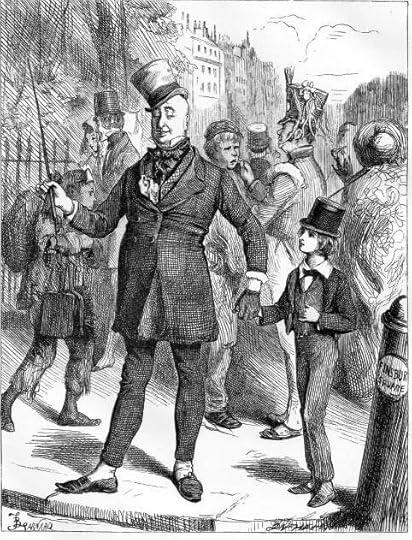
"Mr Micawber impressing streets upon me..." by Fred Barnard, 1872

Mr Micawber by Kyd, 1910

An alternate drawing of Mr Micawber by Kyd

Mr Micawber conducts David home by Harold Copping, 1924
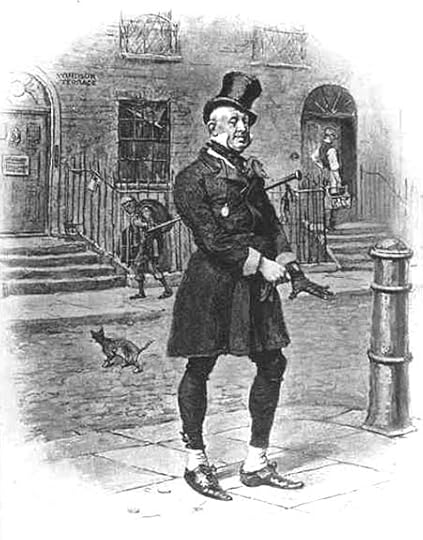
Another view of Mr Micawber by Fred Barnard, maybe 1912
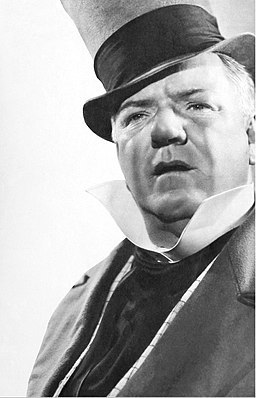
W.C. Fields as Mr Micawber in the 1935 film of DC
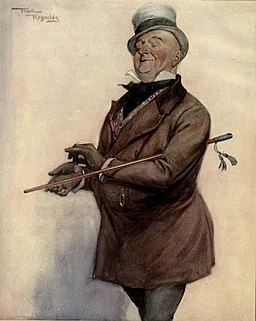
Mr Micawber by Frank Reynolds, 1910

"My magnificent order at the public house" by Phiz, 1849

"I begin life on my own account..." by Fred Barnard, 1872

"I am presented to Mrs Micawber" by Fred Barnard, 1872

"Mr Micawber impressing streets upon me..." by Fred Barnard, 1872

Mr Micawber by Kyd, 1910

An alternate drawing of Mr Micawber by Kyd

Mr Micawber conducts David home by Harold Copping, 1924

Another view of Mr Micawber by Fred Barnard, maybe 1912

W.C. Fields as Mr Micawber in the 1935 film of DC

Mr Micawber by Frank Reynolds, 1910
Chapter 11 is a very autobiographical chapter, Dickens included many things from his own experiences with the blacking factory and his family's time spent in debtors' prison. Mr Micawber is based on Dickens' father, John, and Mrs Micawber reflects Dickens' mother, Elizabeth. This well known quote from Mr Micawber was what Dickens' father told him -
...if a man had twenty pounds a-year for his income, and spent nineteen pounds nineteen shillings and sixpence, he would be happy, but that if he spent twenty pounds one he would be miserable.
Before John Dickens was taken to debtors' prison, Elizabeth Dickens attempted to start a school out of their home. The result was exactly as David relates for the Micawbers -
‘Mrs. Micawber’s Boarding Establishment for Young Ladies’: but I never found that any young lady had ever been to school there; or that any young lady ever came, or proposed to come; or that the least preparation was ever made to receive any young lady.
Young Dickens did enter a public house and ask for a pint of the best ale with a good head on it, just as David does. Watching the coal heavers dancing was something Dickens did, mentioned by John Forester in Vol. 1 of his Dickens biography.
David's feelings reflect Dickens' own feelings at the time he was sent to the blacking factory, the feeling of being expendable -
but it is matter of some surprise to me, even now, that I can have been so easily thrown away at such an age. A child of excellent abilities, and with strong powers of observation, quick, eager, delicate, and soon hurt bodily or mentally, it seems wonderful to me that nobody should have made any sign in my behalf. But none was made; and I became, at ten years old, a little labouring hind in the service of Murdstone and Grinby.
David Copperfield is a fantastic book so far, and I feel so bad for all he's been through already in his short life. But knowing Dickens based this on what actually happened to him, at the age of 12, gives it another degree of tragedy.
Be sure to read through the original DC group read thread for chapter 11 - Jean has fantastic information there on Dickens' life reflected and recounted in this part of the book.
https://www.goodreads.com/topic/show/...
...if a man had twenty pounds a-year for his income, and spent nineteen pounds nineteen shillings and sixpence, he would be happy, but that if he spent twenty pounds one he would be miserable.
Before John Dickens was taken to debtors' prison, Elizabeth Dickens attempted to start a school out of their home. The result was exactly as David relates for the Micawbers -
‘Mrs. Micawber’s Boarding Establishment for Young Ladies’: but I never found that any young lady had ever been to school there; or that any young lady ever came, or proposed to come; or that the least preparation was ever made to receive any young lady.
Young Dickens did enter a public house and ask for a pint of the best ale with a good head on it, just as David does. Watching the coal heavers dancing was something Dickens did, mentioned by John Forester in Vol. 1 of his Dickens biography.
David's feelings reflect Dickens' own feelings at the time he was sent to the blacking factory, the feeling of being expendable -
but it is matter of some surprise to me, even now, that I can have been so easily thrown away at such an age. A child of excellent abilities, and with strong powers of observation, quick, eager, delicate, and soon hurt bodily or mentally, it seems wonderful to me that nobody should have made any sign in my behalf. But none was made; and I became, at ten years old, a little labouring hind in the service of Murdstone and Grinby.
David Copperfield is a fantastic book so far, and I feel so bad for all he's been through already in his short life. But knowing Dickens based this on what actually happened to him, at the age of 12, gives it another degree of tragedy.
Be sure to read through the original DC group read thread for chapter 11 - Jean has fantastic information there on Dickens' life reflected and recounted in this part of the book.
https://www.goodreads.com/topic/show/...
 The only thing I highlighted in this chapter was the name of one of Davy’s coworkers...Mealy Potatoes!
The only thing I highlighted in this chapter was the name of one of Davy’s coworkers...Mealy Potatoes!I liked all the descriptions of the food Davy bought on the way to work. It very much reminded me of the chapters on food and work in The Victorian City: Everyday Life in Dickens' London.
And Mr Micawber may be terrible with money and the family poor but they never take advantage of Davy.
 Cozy_Pug wrote: "Chapter 11 is a very autobiographical chapter, Dickens included many things from his own experiences with the blacking factory and his family's time spent in debtors' prison. Mr Micawber is based o..."
Cozy_Pug wrote: "Chapter 11 is a very autobiographical chapter, Dickens included many things from his own experiences with the blacking factory and his family's time spent in debtors' prison. Mr Micawber is based o..."All really interesting, CP. Thank you. It makes the text come alive even more.
 Chapter 12 The Micawbers move on to a new life away from London and Davy plans to visit Aunt Betsey and ask for her help. We know that things rarely go right for young Davy and so it’s no surprise that a thieving youth steals his money and possessions from him. Davy’s honesty in not collecting his final wage from Murdstone and Grinby is very touching and he deserves better. I fear now for what will happen to him on the road to Dover.
Chapter 12 The Micawbers move on to a new life away from London and Davy plans to visit Aunt Betsey and ask for her help. We know that things rarely go right for young Davy and so it’s no surprise that a thieving youth steals his money and possessions from him. Davy’s honesty in not collecting his final wage from Murdstone and Grinby is very touching and he deserves better. I fear now for what will happen to him on the road to Dover.
Chapter 12 illustration -

"Come to the pollis" by Fred Barnard, 1870s
This illustration, with people standing around and watching, reminds me of the chapter in The Victorian City: Everyday Life in Dickens' London called "Street Theatre" -
Boys were not alone in openly showing curiosity. Adults of all sorts felt it entirely natural to take an interest in the goings-on in the streets.

"Come to the pollis" by Fred Barnard, 1870s
This illustration, with people standing around and watching, reminds me of the chapter in The Victorian City: Everyday Life in Dickens' London called "Street Theatre" -
Boys were not alone in openly showing curiosity. Adults of all sorts felt it entirely natural to take an interest in the goings-on in the streets.
Chapter 12 with endings and beginnings has me excited to see Aunt Betsey again! Even with all their troubles, the Micawbers were kind to David and treated him well. He could so easily have ended up staying with another variety of Murdstones in London.
David is a brave young boy, taking off for Dover to find a woman who may want nothing to do with him. I love though how he remembers and focuses on one tiny bit of the story his mother told him - that on the night he was born, Aunt Betsey gently touched his mother's hair. What a small thing to hang one's hopes on!
Tomorrow is a free day. We pick up on Wednesday with chapter 13.
David is a brave young boy, taking off for Dover to find a woman who may want nothing to do with him. I love though how he remembers and focuses on one tiny bit of the story his mother told him - that on the night he was born, Aunt Betsey gently touched his mother's hair. What a small thing to hang one's hopes on!
Tomorrow is a free day. We pick up on Wednesday with chapter 13.
Lovely illustrations and comments here :)
There's no need for me to repeat from the original thread (thanks for the link to the new thread Cozy-Pug. Once you're there, you can use Nisa's links for the next few chapters), but just to add a bit of extra info. as Janelle picked up the name for Mealy Potatoes ... named for his pale complexion.
There's no need for me to repeat from the original thread (thanks for the link to the new thread Cozy-Pug. Once you're there, you can use Nisa's links for the next few chapters), but just to add a bit of extra info. as Janelle picked up the name for Mealy Potatoes ... named for his pale complexion.
The boys in the factory are based on Charles Dickens co-workers in the blacking factory.
Mick Walker was based on the senior boy at Warren's Blacking Factory, who had been attentive to Charles Dickens. His name in real life was Bob Fagin (you may recognise this name! Charles Dickens had used it earlier, in Oliver Twist). He tried to help the young Charles with the pain in his side, by filling blacking bottles with hot water. He also tried to see him safely home.
The original for Mealy Potatoes was Pol (Paul) Green who had an air of romance about him, because his father worked as a fireman at one of the theatres.
Mick Walker was based on the senior boy at Warren's Blacking Factory, who had been attentive to Charles Dickens. His name in real life was Bob Fagin (you may recognise this name! Charles Dickens had used it earlier, in Oliver Twist). He tried to help the young Charles with the pain in his side, by filling blacking bottles with hot water. He also tried to see him safely home.
The original for Mealy Potatoes was Pol (Paul) Green who had an air of romance about him, because his father worked as a fireman at one of the theatres.
Janelle (and Trisha) - "Surely his mother or father would’ve left him something"
No, I'm afraid not. In English law at this time, as soon as Clara married, all her property and money transferred ownership, and now everything belongs to her husband. Any "straitened circumstances" Mr. Murdstone refers to are because of his own business, and the fact that he is now responsible for all the family decisions. It is his choice to not put any further money into David's education, and nobody can legally contest it.
No, I'm afraid not. In English law at this time, as soon as Clara married, all her property and money transferred ownership, and now everything belongs to her husband. Any "straitened circumstances" Mr. Murdstone refers to are because of his own business, and the fact that he is now responsible for all the family decisions. It is his choice to not put any further money into David's education, and nobody can legally contest it.
 I love that David has decided to make a "run for it" so to speak and seek out his Aunt Betsey. I'm sure it won't be an easy task as he's already met with trouble just trying to get his things sent to Dover. Poor little guy, I sure hope that things will start to look up a bit soon! It's almost as if, that phrase - when it rains it pours. David needs a break and for something to go his way. I hope Dover will be the answer. He's charming and intelligent and I hope Betsey will fall in love with him!
I love that David has decided to make a "run for it" so to speak and seek out his Aunt Betsey. I'm sure it won't be an easy task as he's already met with trouble just trying to get his things sent to Dover. Poor little guy, I sure hope that things will start to look up a bit soon! It's almost as if, that phrase - when it rains it pours. David needs a break and for something to go his way. I hope Dover will be the answer. He's charming and intelligent and I hope Betsey will fall in love with him!
 Bionic Jean wrote: "Janelle (and Trisha) - "Surely his mother or father would’ve left him something"
Bionic Jean wrote: "Janelle (and Trisha) - "Surely his mother or father would’ve left him something"No, I'm afraid not. In English law at this time, as soon as Clara married, all her property and money transferred o..."
Thanks for confirming this, Jean. We certainly had some strange laws at that time. Though I wonder why a woman in Clara’s situation would risk remarrying unless she was very sure about her new husband. She must have known the possible consequences for herself & for her son.
Trisha wrote: "Bionic Jean wrote: "Janelle (and Trisha) - "Surely his mother or father would’ve left him something"
No, I'm afraid not. In English law at this time, as soon as Clara married, all her property and..."
Given Clara's immaturity on money matters, I'm not sure she would've thought of the ramifications.
No, I'm afraid not. In English law at this time, as soon as Clara married, all her property and..."
Given Clara's immaturity on money matters, I'm not sure she would've thought of the ramifications.
 I'm a bit behind in my reading (busy weekend here) but I just finished Chapter 11 - and read through the original group read thread of DC, as well as ours. Wonderful insights all that really add depth to this chapter.
I'm a bit behind in my reading (busy weekend here) but I just finished Chapter 11 - and read through the original group read thread of DC, as well as ours. Wonderful insights all that really add depth to this chapter.I was so excited to finally read the famous quote by Mr. Micawber, about the prudence of not overspending, and have all the context of the story to go with it. And I absolutely loved the sentence that follows that famous quote "After which he borrowed a shilling of me" at which point I laughed aloud!
Knowing now that Mr. Micawber is based on John Dickens, I find it interesting that when we are first introduced to this character the cadence of his speech is so confusing that Mr. Quinion had to translate for Davy what Mr. Micawber was saying. It makes me wonder now if this is a way for Charles Dickens to illustrate that he had a hard time understanding his own father's choices and motives. That he found his father to be a confusing sort of man.
I also loved how Murdstone & Grinby condenses to "grindstone", reflecting the work Davy does there.
I was reminded of Oliver Twist by this section:
"I know that I worked, from morning until night, with common men and boys, a shabby child. I know that I lounged about the streets, insufficiently and unsatisfactorily fed. I know that, but for the mercy of God, I might easily have been, for any care that was taken of me, a little robber or a little vagabond."
How easy it would have been for Davy (or Charles Dickens), to fall in league with the Artful Dodger, or Bill Sikes. And while this whole autobiographical section makes me feel both for Davy and Charles Dickens as a boy, I am also conscious of the feeling that if Charles Dickens had not suffered this fate at an early age, we may never have had these amazing stories to read. Its quite amazing people still love his work 170 years later.
Cozy_Pug and Janelle - Clara was a typical Victorian woman, with obedience to the males in her life as her watchword.
She was flattered by Mr. Murdstone, and not at all likely to question his authority. So even before their marriage she would have trusted that he knew best. It was a disgrace to be single and female; even widows were thought of as "lesser" women than married ones, as the husband conferred any status.
Clara rounded on Peggotty for questioning her marriage plans. She viewed marriage to Mr. Murdstone as probably her last chance to find security for David. She thought it would be good for David to have a role model, and she was not at all independent- minded. She was also affectionate, easily impressed and not very intelligent. If you remember, Peggotty was the one who made decisions in the family before Clara's marriage (except for that one!) and Clara was like a child. She did not, could not, think for herself, and had few rights in law.
At the moment I'm reading a book on the history of Britain, and was reminded today that even as late as 1942 women were still legally dependents. Equal inheritance had come about in 1922. For equal pay, we waited until 1970. Women could not open their own bank account until 1975! Those so-called independent Victorian females we read of, would have had a "man of business" acting on their behalf, as they had so few rights in law.
So overall in 1850 women just did not have the same world view. The questions we might ask, simply did not occur to them. Clara would have taken advice from a male in her family, but she had no male relative to advise her.
We really do have to adjust our mindset to the Victorian one whenever we question any character's motives.
She was flattered by Mr. Murdstone, and not at all likely to question his authority. So even before their marriage she would have trusted that he knew best. It was a disgrace to be single and female; even widows were thought of as "lesser" women than married ones, as the husband conferred any status.
Clara rounded on Peggotty for questioning her marriage plans. She viewed marriage to Mr. Murdstone as probably her last chance to find security for David. She thought it would be good for David to have a role model, and she was not at all independent- minded. She was also affectionate, easily impressed and not very intelligent. If you remember, Peggotty was the one who made decisions in the family before Clara's marriage (except for that one!) and Clara was like a child. She did not, could not, think for herself, and had few rights in law.
At the moment I'm reading a book on the history of Britain, and was reminded today that even as late as 1942 women were still legally dependents. Equal inheritance had come about in 1922. For equal pay, we waited until 1970. Women could not open their own bank account until 1975! Those so-called independent Victorian females we read of, would have had a "man of business" acting on their behalf, as they had so few rights in law.
So overall in 1850 women just did not have the same world view. The questions we might ask, simply did not occur to them. Clara would have taken advice from a male in her family, but she had no male relative to advise her.
We really do have to adjust our mindset to the Victorian one whenever we question any character's motives.
Bridget wrote: "It makes me wonder now if this is a way for Charles Dickens to illustrate that he had a hard time understanding his own father's choices and motives. That he found his father to be a confusing sort of man ..."
What a great insight :)
And what a good idea to use the day between installments to read the relevant parts in the original group read, for even more insights from "Dickensians!" Off hand I can't think of anyone who didn't love this story :)
What a great insight :)
And what a good idea to use the day between installments to read the relevant parts in the original group read, for even more insights from "Dickensians!" Off hand I can't think of anyone who didn't love this story :)
 Bionic Jean wrote: "Cozy_Pug and Janelle - Clara was a typical Victorian woman, with obedience to the males in her life as her watchword.
Bionic Jean wrote: "Cozy_Pug and Janelle - Clara was a typical Victorian woman, with obedience to the males in her life as her watchword. She was flattered by Mr. Murdstone, and not at all likely to question his aut..."
You’re full of fascinating information, Jean. I can’t believe women couldn’t open their own bank account until 1975! I’m shocked! I opened my first in 1977 but little did I know how recently I would have been refused. Reading DC is broadening my knowledge in so many unexpected ways. Thank you so much!
 Fiona wrote: "Bionic Jean wrote: "Cozy_Pug and Janelle - Clara was a typical Victorian woman, with obedience to the males in her life as her watchword.
Fiona wrote: "Bionic Jean wrote: "Cozy_Pug and Janelle - Clara was a typical Victorian woman, with obedience to the males in her life as her watchword. She was flattered by Mr. Murdstone, and not at all likely..."
It really is crazy how recently women got rights we take for granted today. I don't want to get us too far off topic, but when my parents divorced in 1976, the only way my mother could get a credit card was by asking her father to co-sign on it. She was 30 years old at the time, and had been working since she was 16yo.
I think we're still on topic Bridget, since we were talking about how "money savvy" a woman like Clara could have been!
Bridget wrote: "I'm a bit behind in my reading (busy weekend here) but I just finished Chapter 11 - and read through the original group read thread of DC, as well as ours. Wonderful insights all that really add de..."
I've been thinking along these lines as I read Dickens bios. What if he'd gone in the direction of theater and never wrote these novels?! It's hard to imagine.
I've been thinking along these lines as I read Dickens bios. What if he'd gone in the direction of theater and never wrote these novels?! It's hard to imagine.
 Chapter 12 felt like a very big transitional chapter with David planning and making his escape, and of course, that thief makes away with his box and money. Just David's luck. It seems like very few people are to be trusted in David's life.
Chapter 12 felt like a very big transitional chapter with David planning and making his escape, and of course, that thief makes away with his box and money. Just David's luck. It seems like very few people are to be trusted in David's life. I really liked David spending time with the Mr. and Mrs. Micawber, sort of like a family to him. And I love Mr. Micawber's quote: "never do tomorrow what you can do today."
Cozy_Pug wrote: "What if he'd gone in the direction of theater and never wrote these novels?! It's hard to imagine ..."
It is isn't it? Charles Dickens is so much a part of our lives and cultures. My answer is that I think he would have been a lot happier - it was his True Love - but we would have missed out on so much!
It is isn't it? Charles Dickens is so much a part of our lives and cultures. My answer is that I think he would have been a lot happier - it was his True Love - but we would have missed out on so much!
Franky wrote: "I love Mr. Micawber's quote: "never do tomorrow what you can do today."..."
Yes, and its continuation too is famous: "procrastination is the thief of time". It's supremely ironic, coming as it does from the speechifying, bombastic (but well-meaning) Mr. Micawber.
Mr. Micawber is the closest Charles Dickens ever got to depicting his own father in fiction. And Mrs. Micawber was based on his mother (although she tends to pop up in different incarnations in many of his works).
Yes, and its continuation too is famous: "procrastination is the thief of time". It's supremely ironic, coming as it does from the speechifying, bombastic (but well-meaning) Mr. Micawber.
Mr. Micawber is the closest Charles Dickens ever got to depicting his own father in fiction. And Mrs. Micawber was based on his mother (although she tends to pop up in different incarnations in many of his works).
 Franky wrote: "Chapter 12 felt like a very big transitional chapter with David planning and making his escape, and of course, that thief makes away with his box and money. Just David's luck. It seems like very fe..."
Franky wrote: "Chapter 12 felt like a very big transitional chapter with David planning and making his escape, and of course, that thief makes away with his box and money. Just David's luck. It seems like very fe..."I also marked that line from Mr. Micawber. (Such good advice - which I really should follow, though I hardly ever do) I think it was Benjamin Franklin who originally said "never put off till tomorrow what you can do today". I don't think he added anything about procrastination though. He did say "lost time is never found" which is another of my favorite quotes
Bionic Jean wrote: "Cozy_Pug wrote: "What if he'd gone in the direction of theater and never wrote these novels?! It's hard to imagine ..."
It is isn't it? Charles Dickens is so much a part of our liv..."
I agree - I think he would've benefited from the regular audience applause and adoration of the theatre. But it's a strange train of thought to follow - an alternate universe with no Dickens novels! :0
It is isn't it? Charles Dickens is so much a part of our liv..."
I agree - I think he would've benefited from the regular audience applause and adoration of the theatre. But it's a strange train of thought to follow - an alternate universe with no Dickens novels! :0
 Bridget wrote: "Franky wrote: "Chapter 12 felt like a very big transitional chapter with David planning and making his escape, and of course, that thief makes away with his box and money. Just David's luck. It see..."
Bridget wrote: "Franky wrote: "Chapter 12 felt like a very big transitional chapter with David planning and making his escape, and of course, that thief makes away with his box and money. Just David's luck. It see..."I knew I had heard that quote somewhere before. It is a great quote and one to live by, I agree.
 Bridget wrote: "Fiona wrote: "Bionic Jean wrote: "Cozy_Pug and Janelle - Clara was a typical Victorian woman, with obedience to the males in her life as her watchword.
Bridget wrote: "Fiona wrote: "Bionic Jean wrote: "Cozy_Pug and Janelle - Clara was a typical Victorian woman, with obedience to the males in her life as her watchword. She was flattered by Mr. Murdstone, and not..."
So glad I am living today. For many reasons.
Chapter 13 illustrations -
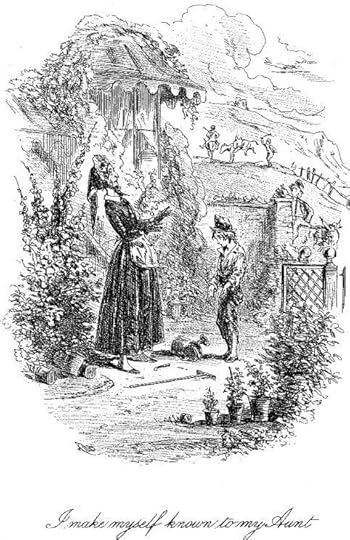
"I make myself known to my aunt" by Phiz, 1849
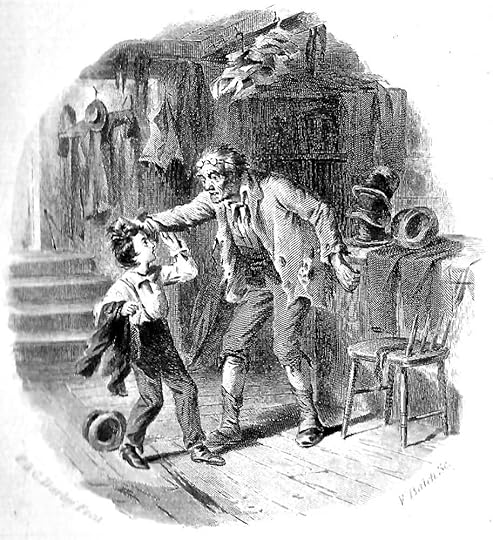
"When an ugly old man..." (the goroo man) by Felix O.C. Darley, 1867
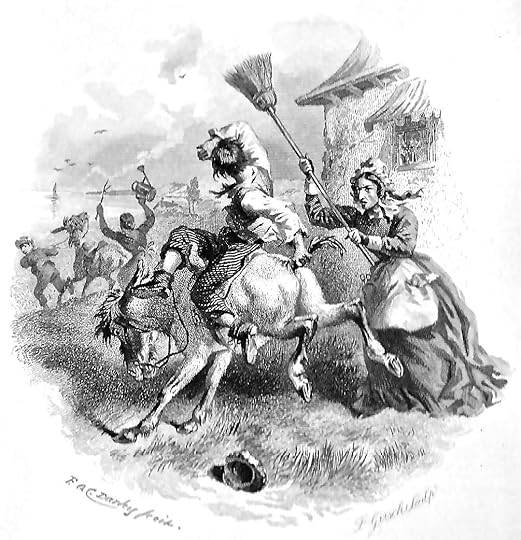
"Janet! Donkeys!" By Felix O.C. Darley, 1863

"Oh my lungs and liver, will you go for threepence?" by Fred Barnard, 1870s
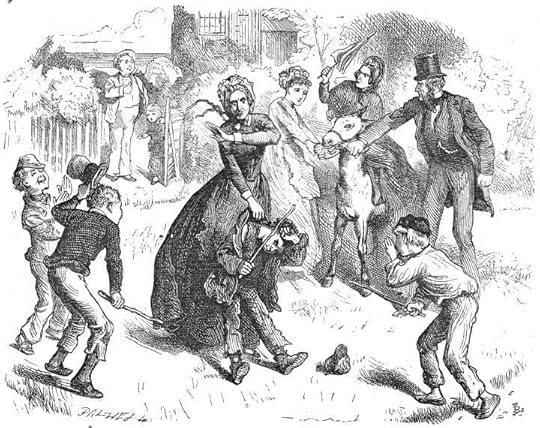
"The battle on the green" by Fred Barnard, 1870s

"David Copperfield" by Kyd, 1910

"I make myself known to my aunt" by Phiz, 1849

"When an ugly old man..." (the goroo man) by Felix O.C. Darley, 1867

"Janet! Donkeys!" By Felix O.C. Darley, 1863

"Oh my lungs and liver, will you go for threepence?" by Fred Barnard, 1870s

"The battle on the green" by Fred Barnard, 1870s

"David Copperfield" by Kyd, 1910
Oh my stars, crying with laughter at Aunt Betsey!! "Janet! Donkeys!"
:D
It seems like a very random thing Dickens wrote in for comedic purposes, because it's absolutely hysterical. But I'm wondering if people pleasure-riding donkeys was a common problem for home owners, worried about their lawns and gardens being torn up.
The one great outrage of her life, demanding to be constantly avenged, was the passage of a donkey over that immaculate spot.
Jugs of water, and watering-pots, were kept in secret places ready to be discharged on the offending boys; sticks were laid in ambush behind the door; sallies were made at all hours; and incessant war prevailed.
:D These descriptions and the illustrations of Aunt Betsey and Janet at war have made my day! I cannot wait to see Maggie Smith play this out!
I also appreciate Aunt Betsey's (biased) view of Clara's second marriage - she sums up pretty well what I felt about it. Even knowing that at the time, a widow was a precarious situation to be in, I agree with Aunt Betsey -
"she marries a second time—goes and marries a Murderer—or a man with a name like it—and stands in THIS child’s light!"
Mr Murdstone may not be a murderer, but he for sure murdered David's childhood.
What a lovely, peaceful end for David at the end of the chapter - I'm so relieved he's made it to Aunt Betsey and, so far, not been turned away -
The room was a pleasant one, at the top of the house, overlooking the sea, on which the moon was shining brilliantly...I remember how I seemed to float, then, down the melancholy glory of that track upon the sea, away into the world of dreams.
:D
It seems like a very random thing Dickens wrote in for comedic purposes, because it's absolutely hysterical. But I'm wondering if people pleasure-riding donkeys was a common problem for home owners, worried about their lawns and gardens being torn up.
The one great outrage of her life, demanding to be constantly avenged, was the passage of a donkey over that immaculate spot.
Jugs of water, and watering-pots, were kept in secret places ready to be discharged on the offending boys; sticks were laid in ambush behind the door; sallies were made at all hours; and incessant war prevailed.
:D These descriptions and the illustrations of Aunt Betsey and Janet at war have made my day! I cannot wait to see Maggie Smith play this out!
I also appreciate Aunt Betsey's (biased) view of Clara's second marriage - she sums up pretty well what I felt about it. Even knowing that at the time, a widow was a precarious situation to be in, I agree with Aunt Betsey -
"she marries a second time—goes and marries a Murderer—or a man with a name like it—and stands in THIS child’s light!"
Mr Murdstone may not be a murderer, but he for sure murdered David's childhood.
What a lovely, peaceful end for David at the end of the chapter - I'm so relieved he's made it to Aunt Betsey and, so far, not been turned away -
The room was a pleasant one, at the top of the house, overlooking the sea, on which the moon was shining brilliantly...I remember how I seemed to float, then, down the melancholy glory of that track upon the sea, away into the world of dreams.
 I can add absolutely nothing to what you have said about Chapter 13, CP. You’ve even quoted my favourite passages and saved me from copying them out :)
I can add absolutely nothing to what you have said about Chapter 13, CP. You’ve even quoted my favourite passages and saved me from copying them out :) It was a long, hard journey for David and we ache for the naivety of the child being taken advantage of, or teased by, everyone. He has arrived somewhere safe though, albeit a complete madhouse!
Did the ‘goroo’ man remind anyone else of Albert Steptoe - “you dirty old man”!!?
 This was a great chapter and one of some relief for David and the reader!
This was a great chapter and one of some relief for David and the reader! CP- I read the original thread and Jean mentions that the donkey incident actually happened to the woman he based Aunt Betsey on. I mean, it is quite comical and vivid a scene that it makes sense that it would be an actual event.
I am pleased that Betsey doesn't seem to have such a heart of steel like her accoutrements but found it quite interesting that she kept asking Mr. Dick(I think it was) for his opinion of what to do with her brother's son. And then she complied which put David in a much better place, even though I laughed at the contraption of fabric he was rolled up in - made me think he must have looked like the Pillsbury Dough Boy!
One other bit that stood out was while on the journey to Dover, David stops in Chatham and this is where he sells his jacket in the marine shop to the "Goroo" man. Oh my eyes and limbs, what d you want? Oh my lungs and liver, what do you want? Oh, gore, gore!
If I remember correctly from Forester's bio, this is the place young Charles Dickens loved the most from his childhood and where the family lived before being sent to London. He would have had a great remembrance of this place and his descriptions of the wharfs and boats and soldiers were fantastic.
and toiling into Chatham - which, in that night's aspect, is a mere dream of chalk, and drawbridges, and mastless ships in a muddy river, roofed like Noah's arks, - crept, at last upon a sort of grass-grown battery overhanging a lane, where a sentry was walking to a fro.
And the last thing that stood out which I wondered about was when Aunt Betsey was opining about Clara's second marriage she says She had got a baby - oh, there were a pair of babies when she gave birth to this child sitting here, that Friday night!
I'm thinking that there's not any real meaning behind that just her desire that there was a girl as well. What do you all make of this?
I'm looking forward to David's next day and to finding out what happens with Aunt Betsey!
Books mentioned in this topic
David Copperfield (other topics)A Message from the Sea (other topics)
Bleak House (other topics)
Little Dorrit (other topics)
A Message from the Sea (other topics)
More...
Authors mentioned in this topic
Charles Dickens (other topics)Charles Dickens (other topics)
Charles Dickens (other topics)
Charles Dickens (other topics)
John Forster (other topics)
More...





We do have an "Aunt Betsey Fan Club" here in "Dickensians!" :)